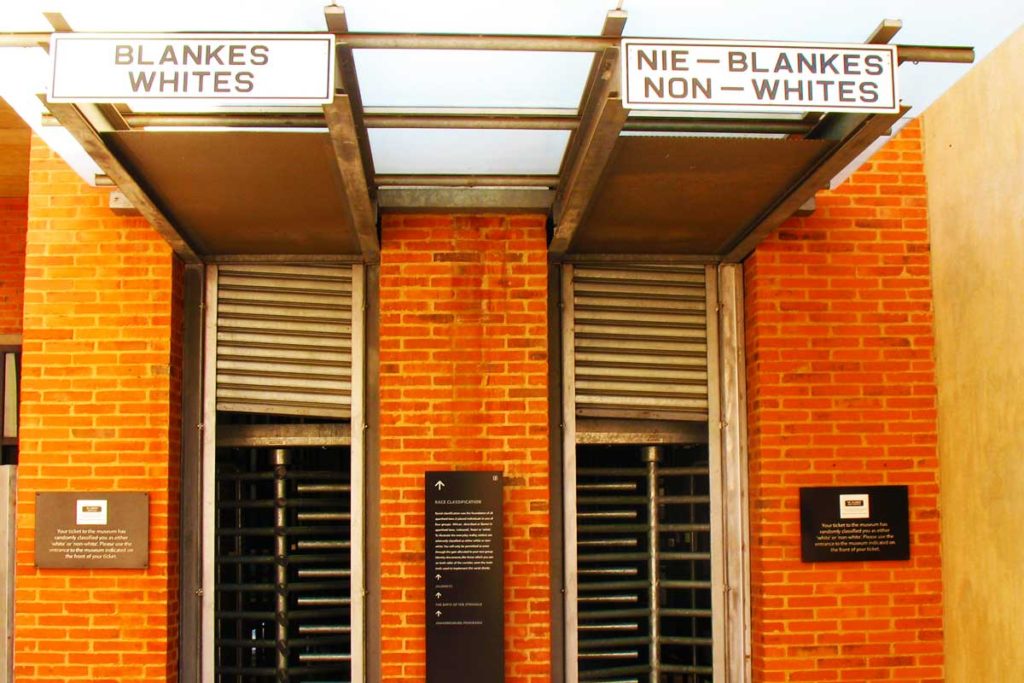South Africa. The Rainbow Nation. Like many other places, -isms rear their hydra-like heads as frequently as politicians misspeak, but racism features most prominently on the Rainbow Nation’s landscape.
“That’s racist!” “You’re a racist!” are statements you’ll hear often, in one form or another, in my temporary home of Johannesburg. It was a younger, fresher-faced Julius Malema who gave a certain notoriety to the phrase “That’s racist” and made it a rallying cry for many who felt themselves disenfranchised in the face of economic inequality.
Two recent incidents, following hard on each other’s heels, made me focus on what racism does or does not look like in South Africa, and how easily card-waving can obfuscate other issues.
A friend and I were sitting in a restaurant steadily working our way into a drunk and disorderly state on some very strong, but cheap, cocktails. We were in the happy-buzz phase of our drinking when we heard a commotion to the right of us (having both heard it, I couldn’t put it down to alcohol-fuelled voices in my head).
A young black woman was hurling abuse at the white restaurant manager, accusing him of being a racist asshole, while punching holes in his chest with her right forefinger. Part of me was tempted to get up and intervene, but the part of me that controlled my legs was having none of it. Sickly-sweet, apple-flavoured vodka combinations had decommissioned my legs from active duty – intervention denied.
We watched as she continued to berate him, setting the air alight as she waved the race card around. At this point, most diners had lost interest in their meals and all eyes and ears were trained on her. She eventually wound her neck back in, and stomped out through a trail of slack jaws and popped eyes, disbelief seasoning the previously calm and genteel air.
Being, at that point, rather friendly with the porters of beverages of a significantly intoxicating nature (read: waiters), we called one of them over to explain the kerfuffle. In hushed but eager tones he detailed how she came in, ordered a drink, was brought some bread (this being an establishment a step or two above the low service expectations of a drive-through chicken joint), didn’t order a meal and refused to pay the princely sum of fifteen rand for said bread (R15 being less than a dollar at the time).
So what she was claiming to be racism was in actual fact a case of her being cheap. I’m sure when Mandela sat in his Robben Island cell, his heart was warmed by the thought that many years after his release, his and his fellow freedom fighters’ revolutionary zeal could be traded in for less than a dollar, in an argument over a bit of bread served with cheap unsalted butter.
Fast forward a few hours; the same friend and I were having lunch at a Chinese restaurant. I was at the buffet, trying to exercise some restraint so as not to need an ox-cart to pull my plate back to the table.
An old white man tapped me on the shoulder – my hatred of the familiarity implied in such a gesture is a rant for another day. I turned around. He said “You like Chinese”. Unfazed, I gave a monosyllabic “Yes,” my presence at that particular restaurant surely being a sign of my approval of Chinese cuisine.
Undeterred by my obvious unwillingness to use my mouth for anything other than a food depository, he ploughed on with “Because you are the only Africans here.” My ability to respond was instantly decommissioned, much like being legless the previous night.
What seemed like an eternity later, the food depository managed to croak “Yes, along with all the staff here.” I staggered away from the casual (but wrinkled) face of racism, plate light as a feather, heart carrying its weight instead.
What was he expecting from me in that interaction? That I’d embrace my tokenism and gleefully do a jig about how wonderful the Rainbow Nation™ is? Why was my African-ness such a big concern that it needed to be brought to my attention?
He didn’t simply see a person having lunch, there to enjoy a good meal. He saw instead an African trying something new, which to his mind was so novel an experience that it warranted comment.
When Thabo Mbeki opined on the virtues of being an African in his speech, maybe he should also have included ‘willingness to try exotic foods’, to help ease the path to culinary adventures for us Africans. Because my, isn’t the native brave and bold when he steps away from his samp and beans, which he shovels in with his hands from a communal plate?
Neither of these two incidents showed the main players in a positive light.
In making a cheap accusation of racism to cover for the embarrassment of the shallowness of her pockets, Bread Lady was essentially crying wolf.
And when we face real wolves at Chinese buffet tables and have racist teeth bared in our faces, we’re left grappling for suitable responses to such barefaced racism. Never once did it cross my mind to red card him with the race card. Worse, if I had to do it all over again, I’m not sure I’d react differently.
Can there be a sight more unedifying than an angry black woman berating an old white man, both entrenched in their positions, neither giving quarter, determined on the annihilation of the other?
But maybe that’s the shock needed to jolt old white men awake – you can be sure my slack-jawed response did nothing to shift his notions on the merits of an African voluntarily wielding a pair of chopsticks.
Mea culpa.

